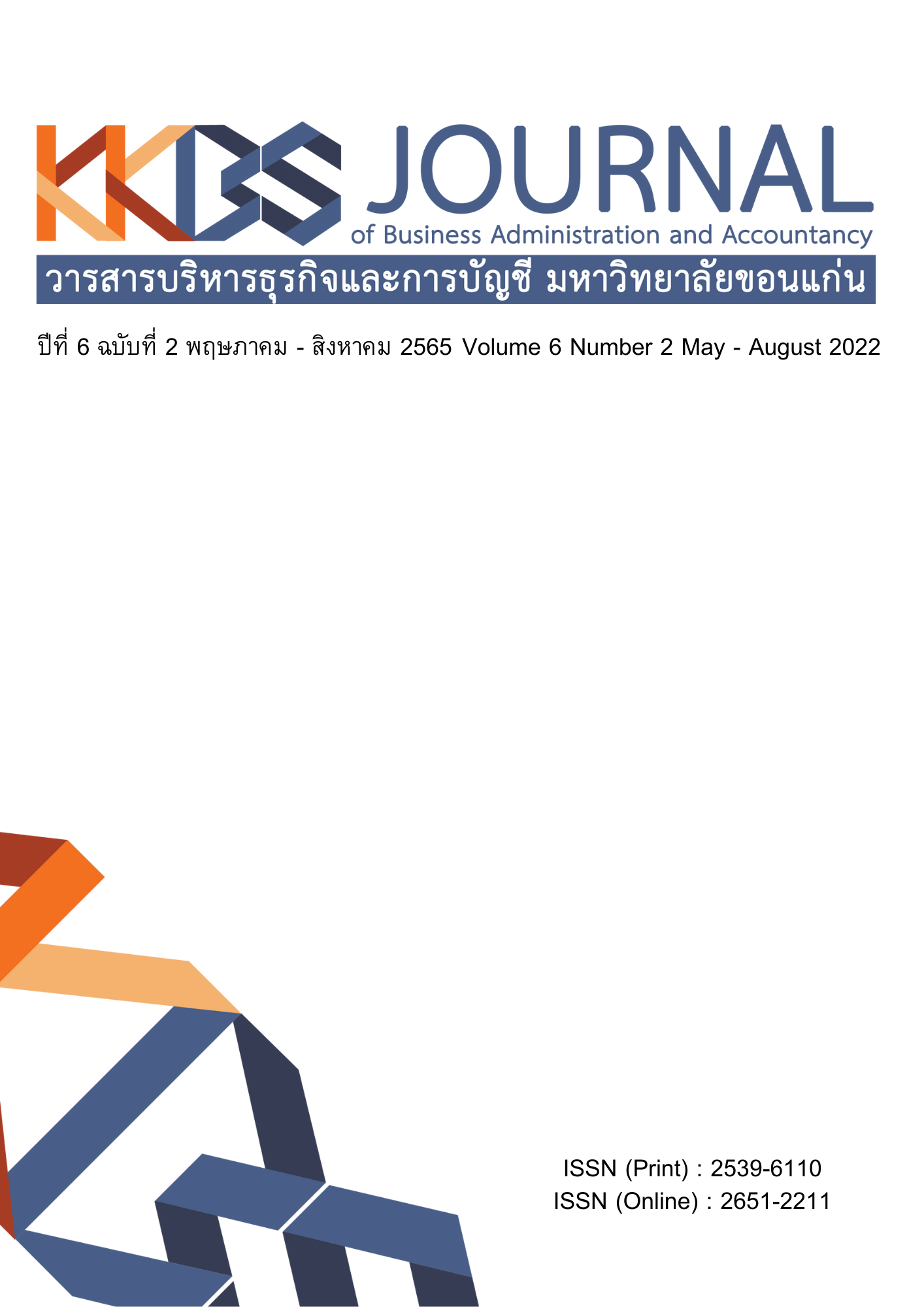Factors Influencing Customer Expectations of Service Quality in a Barbeque Buffet Restaurant: Customer Intention of Using the Service During the New Normal
Main Article Content
Abstract
This study aims to explore factors influencing customer expectations of service quality that affect customer intentions to go to a barbeque buffet restaurant during the New Normal. This research examined six key factors of customers’ purchasing intention including (1) reliability, (2) responsiveness, (3) assurance, (4) empathy, (5) tangible, and (6) Covid-19 prevention. Researchers gathered the data by using a survey questionnaire from 400 participants who went to a barbeque buffet restaurant in a mall during the Covid-19 pandemic. The convenience sampling method was applied to collect the data, and it was interpreted by using descriptive and inferential statistics.
The findings of this study based on the multiple regression analysis indicated that responsiveness was significant. Employees’ responsiveness affected customers’ intention to visit a barbeque buffet restaurant at the mall during the New Normal. However, the results showed that other factors did not have an effect on customer intentions. The results of this study can benefit both academic and practical fields. First, restaurant operators could use the results of this study to improve their service quality to meet customer expectations during the Covid-19 pandemic. Second, the restaurant entrepreneurs could plan to improve employees’ responsiveness to provide service efficiently. It would help the entrepreneurs to strengthen their service quality and attract more customers to visit a restaurant.
Article Details

This work is licensed under a Creative Commons Attribution-NonCommercial-NoDerivatives 4.0 International License.
The articles published in the journals are the authors' opinions, not the opinion of the editorial team or administrative staff. The articles published is copyright of the Journal of Business Administration and Accounting, Khon Kaen University.
References
Amornprasert, S. (2013). Service marketing mixes factors influencing consumers’ service usage behaviors at grilled-meat, Suki-Yaki and ShabuShabu Buffet Restaurants in Thonburi area. Bangkok: Master of Business Administration Program, Srinakarinwirot University. (In Thai)
Aphasakuldath, C. (2016). Consumer behaviors and lifestyle pattern affecting consumers’ loyalty on fast food consumption in Thung Khru, Bangkok. Bangkok: Bangkok University. (In Thai)
Byrne, B.M. (2010). Structural equation modeling with AMOS: Basic concepts, applications, and programming. New York: Routledge.
Fitzsimons, G.J. & Morwitz, V.G. (1996). The effect of measuring intent on brand level purchase behavior. Journal of Consumer Research, 23(June), 1-11.
Ge Song. (2016). Food quality, service quality, physical environment, and health concern affecting Chinese tourists’ decision to choose Thai restaurant services in Bangkok. Bangkok: Graduate School, Bangkok University.
Government Saving Bank. (2020). Sustainability report 2019. Bangkok: The Createa. (In Thai)
Iamsakulrat, C. (2015). Factors influencing consumer’s satisfaction of international food in Bangkok. Bangkok: Graduate School, Bangkok University. (In Thai)
Kaewluang, J. et al. (2020). The behavior and needs of seafood consumption to consumer for buffet restaurant: A case study of the Korean Pork Roast Restaurant in Khon Kaen Province. Khon Kaen: North Eastern University. (In Thai)
Hair, J. et al. (2010) Multivariate data analysis. 7th ed. Upper Saddle River, N.J.: Pearson Educational International.
Kasikorn Research Center. (2020). Consequences of the COVID-19 outbreak to the business of providing on-demand services expected in 2020, the total value will be up to 142 billion baht. Retrieved May 9, 2020, from https://www.kasikornresearch.com/th/analysis/k-econ/business/Pages/z3099.aspx (In Thai)
Khlaisukpong, R. (2017). Food quality, atmosphere and service quality factors affecting perceived value, satisfaction and behavioral intention of roof-top restaurant customers in Bangkok. Bangkok: Bangkok University. (In Thai)
Kim, S. & Thorndike Pysarchik, D. (2000). Predicting purchase intentions for uni-national and bi‐national products. International Journal of Retail & Distribution Management, 28(6), 280-229.
Kongdara, N. (2016). The customers’ satification on Fuji Japanese Restaurant’s services and Zen Japanese Restaurant’s services in Bangkok Metropolis. Nakhon Pathom: Rajamangala University of Techology Rattanakosin. (In Thai)
Kotler, P. (2000). Marketing management: Analyzing consumer marketing and buyer behavior (The Millennium). Upper Saddle River, N.J.: Prentice Hall.
Mei-Fang, C. (2007). Consumer attitudes and purchase intentions in relation to organic foods in Taiwan: Moderating effects of food-related personality traits. Food Quality and Preference, 18(7), 1008-1021.
Mongkhonvanit, C. (2020). The confidence factors affecting the online purchasing decision among Thai Youth. Manutsayasat Wichakan, 27(2), 189-214. (In Thai)
Mowen, J.C. & Minor, M. (1998). Consumer behavior. Upper Saddle River, N.J.: Prentice-Hall.
National Statistic Office. (2018). The 2017 food consumption behavior survey. Bangkok: Office. (In Thai)
Office of the Permanent Secretary for Tourism and Sports. (2020). World Tourism Industry affected from covid-19. Tourism Economic Review, 1(4), 25-29. (In Thai)
Parasuraman, A., Zeithaml, V.A. & Berry, L.L. (1988). SERVQUAL: A multiple-item scale for measuring consumer perceptions of service quality. Journal of marketing 64, 12-40.
Promsong, S., Yonwikai, W., Booranavitayaporn, S. (2019). Factors relating to consumer behavior in a BBQ Buffet Restaurant: A case study of Nuanoey Buffet Ko-Khun & Seafood Restaurant. Dusit Thani College Journal, 14(1), 267-282. (In Thai)
Rangsungnoen, G. (2011). Factor analysis using SPSS and AMOS. Bangkok: Se-Ed. (In Thai)
Rungsatianputorn, N. (2016). Type of restaurants, food quality, service quality, and social network affecting customers’ decision to choose restaurants for dinner in Bangkok. Bangkok: Bangkok University. (In Thai)
Sattavorn, S. (2020). The influence of service quality, perceived value pricing, and hospitality of waiting staff on Japanese restaurants’ customer satisfaction. MUT Journal of Business Administration, 17(1), 179-197. (In Thai)
Thonglup, V. (2016). Factors affecting to service satisfaction on Shabu Restaurants in Bangkok & Perimeter Area. Bangkok: Faculty of Business Administration, Thammasat University. (In Thai)
Tia-Aeamdee, S. (2019). Business differentiation affecting consumer decision making on buffet restaurants in Muang District, Uttaradit Province. Uttaradit: Uttaradit Rajabhat University. (In Thai)


